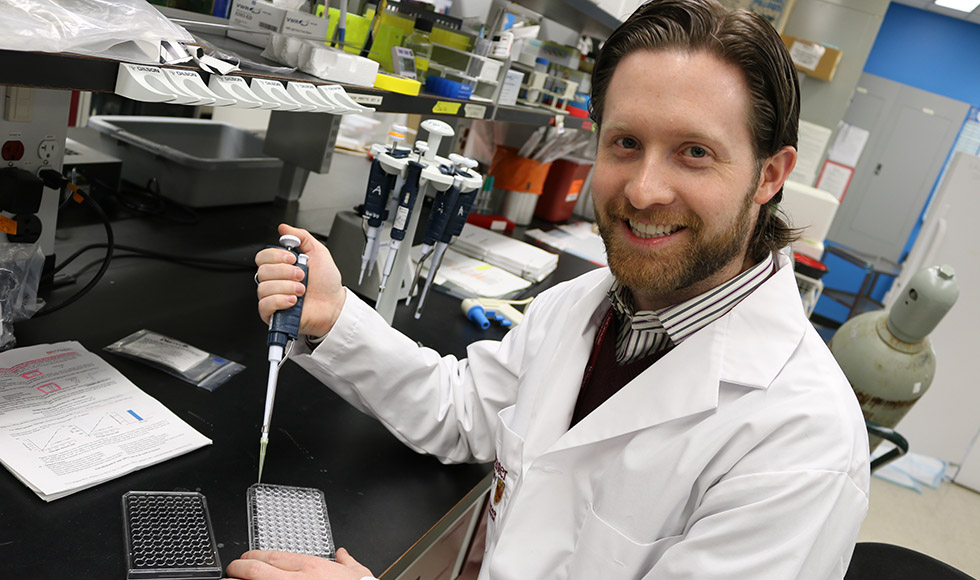$36M federal investment supports McMaster-based research projects

An $8.6-million investment in Canada’s Global Nexus for Pandemics and Biological Threats will enhance Canada's capacity to support the development and biomanufacturing of new vaccines, drugs and diagnostics that will save lives here and around the world, says project lead Matthew Miller.
BY Daniella Fiorentino, Office of the VP (Research)
November 17, 2022
McMaster’s research enterprise has been bolstered by $36 million in federal investments, including more than $8.5 million for biosciences research at Canada’s Global Nexus for Pandemics and Biological Threats.
Federal minister of innovation, science and industry François-Philippe Champagne announced the funding from the Canada Foundation for Innovation (CFI), the Social Sciences and Humanities Research Council (SSHRC), the Canadian Institutes of Health Research (CIHR) and the Canada Research Chairs (CRC) program at the Canadian Science Policy Conference in Ottawa this week.
“From advancing pandemic preparedness to building state-of-the-art data infrastructure to providing support for complex societal issues and recognizing some of Canada’s greatest leaders in research and innovation, these investments will bolster so many incredible and diverse programs of research at McMaster and, ultimately, advance the health and well-being of Canadians and our global community,” says Karen Mossman, McMaster’s vice-president of research.
More than $8.5M for Canada’s Global Nexus
Canada’s Global Nexus for Pandemics and Biological Threats received $8.6 million from CFI’s Biosciences Research Infrastructure Fund (BRIF), which supports upgrades to biocontainment facilities across the country.
The funding will be used to expand a laboratory at McMaster where an internationally renowned team of experts in infectious disease and immunological research are developing new antimicrobials, antivirals, vaccines and diagnostics to combat. some of the world’s most consequential pathogens, including influenza virus, West Nile virus, tuberculosis, and SARS-CoV-2.
“The Global Nexus brings universities, industry partners, community leaders, public health experts and policymakers together in new ways to ensure Canada is better prepared to prevent and respond to infectious diseases,” says project lead Matthew Miller, who is also director of the Michael G. DeGroote Institute for Infectious Disease Research.
“This investment in our laboratory will enhance our national capacity to support the development and biomanufacturing of new vaccines, drugs and diagnostics that will save lives here and around the world.”
$17.4M for national data centre network
Headquartered at McMaster, the Canadian Research Data Centre Network (CRDCN) has received $17.4 million from SSHRC and CIHR. The CRDCN facilitates unique access to Statistics Canada microdata at 33 Research Data Centres (RDCs) for more than 2200 researchers and students across Canada, enabling research and training in a wide array of disciplines in the health and social sciences that inform key areas of public policy.
The investment will provide vital support for the CRDCN’s soon-to-be-launched virtual Research Data Centre (vRDC). As a nationwide data access platform, the vRDC will greatly increase the computational capacity of the Network and provide remote access to researchers working outside of RDCs at the universities.
11 Canada Research Chairs
The announcement also included new and renewed Canada Research Chairs — a national program designed to attract and retain the world’s most accomplished and promising minds.
Eleven McMaster researchers from three faculties have been named CRCs – an investment that totals $10 million. Six of the researchers are new CRCs and five have had their chairs renewed.
More than $500,000 in SSHRC grants
SSHRC’s 2022 Insight Development Grant recipients were also announced. The grants are designed to support research in its early stages and enable researchers to address complex issues about individuals and societies.
Nine McMaster projects were awarded more than $500,000:
• Jonathan Zhang, Faculty of Social Sciences, in collaboration with Stanford University: The Impact of Healthcare Providers on Non-Health Program Take-up
• Jennifer Ma, Faculty of Social Sciences: Mycelium: Racialized migrants’ resistance to systemic discrimination and the promotion of cultural connection and knowledge
• Diana Singh, Faculty of Social Sciences, in collaboration with the University of Toronto: Regulating Emotions at Work: A Study of the Psychosocial Consequences of Emotional Labour from a Multidimensional Perspective
• Basit Iqbal, Faculty of Social Sciences: Beyond Belonging: A Poetics of Estrangement in Muslim Canada
• Lydia Kapiriri, Sheila Boamah, Selina Mudavanhu and Meridith Griffin, Faculties of Social Sciences, Health Sciences and Humanities: Availability, cultural appropriateness and utilization of the interventions designed to address loneliness and social isolation by older Black adults in Hamilton
• Daniel Schmidtke and Anna Moro, Faculty of Humanities: Beyond bridging: linguistic indicators of academic and literacy outcomes of international students in a Canadian university
• Elif Bilgic, Ereny Bassilious, Jonathan Sherbino, Faculty of Health Sciences, with co-applicant Jason Harley (McGill University): How are emotions of medical trainees and faculty impacted by new assessment mandates implemented in medical education?
• Xutong Zhang and Andrea Gonzalez, Faculty of Health Sciences: Capturing parental self-regulation in the context of parenting: A systematic review and an empirical examination of psychosocial predictors
• Addisu Lashitew, DeGroote School of Business: Stakeholder Capitalism, Workers’ Rights and the Drive for Automation


